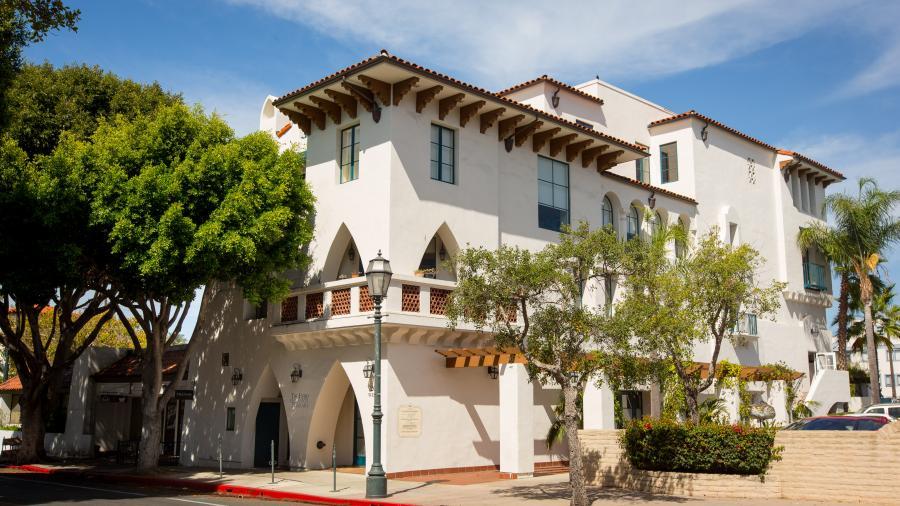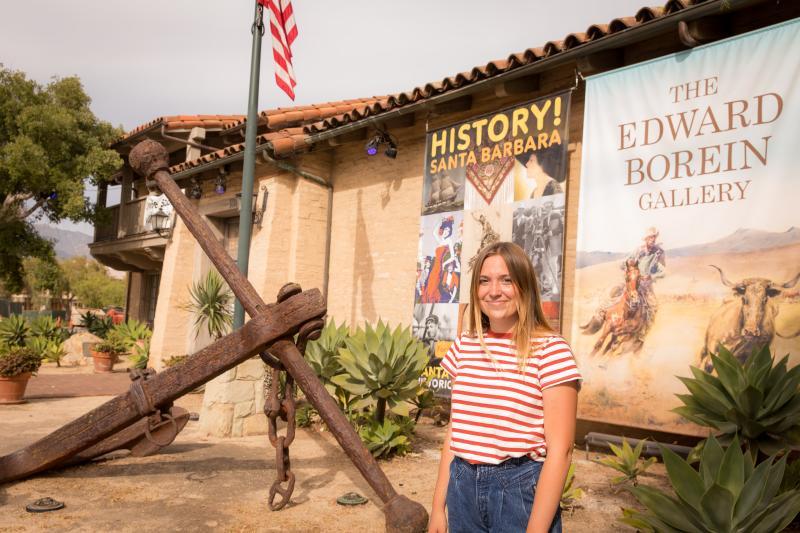Westmont Magazine College Expands Westmont Downtown Programs

The Westmont Downtown semester continues to connect students with businesses and nonprofits based in downtown Santa Barbara. Five centers now operate out of two floors of the Hutton Parker Foundation building on West Anapamu Street, and the directors described their work at a Celebration of Westmont Downtown January 24.
The five centers include the Center for Applied Technology (CATLab), the Center for Social Entrepreneurship, Westmont Initiative for Public Dialogue and Deliberation (WIPPD), Westmont Decision Lab and Westmont Hub (WestHUB).
The college unveiled WestHUB in fall 2019. This business incubator accelerates entrepreneurial ventures across disciplines. Under the umbrella of the Westmont Center for Technology, Creativity and the Moral Imagination, WestHUB offers its partners a collaborative workspace, seed funding, targeted mentorships, a one-unit seminar and community networks. “To tackle real-world problems, our community needs more than just good ideas,” says Don Patterson, Westmont professor of computer science and WestHUB director. “It needs citizens and creators equipped with 360-degree thinking, cross-cultural acumen and robust moral imaginations.”
WestHUB connects innovation and the creation of new ventures with the college’s emphasis on the liberal arts and commitment to the Christian faith. The initiative embraces interdisciplinarity, and the faculty advisory board includes representatives from every division of the college. “WestHub will amplify a diverse range of student projects, invigorating learning-by-doing across college departments,” Patterson says. “We’re set apart from other peer institutions by using our Christian liberal arts conviction to shape entrepreneurial ventures.”
In spring 2020, WestHUB tackled a variety of projects: an innovators podcast for Santa Barbara; food-storage solutions for markets in Rwanda; a telemedicine prototype for cancer care; an art therapy program for mental health support; an app to make digital handouts work like paper handouts and a faith-based dialogue on abortion.
The Center for Applied Technology, which houses the CATLab, creates innovative technology solutions for Westmont through the collaborative efforts of faculty, staff and students. The summer program employs students to develop solutions, which gives them substantial professional experience. For many students, this work becomes a bridge to internships in Santa Barbara and employment after graduation.
The Center for Social Entrepreneurship hosts a range of interdisciplinary and innovative initiatives and programs in social change, problem-solving and community engagement, including the Westmont Downtown Semester in Social Entrepreneurship, which places students in significant internships for 20 hours a week, and the Westmont Initiative for Public Dialogue and Deliberation (WIPPD).
WIPPD works with neighbors to speak and listen well together about challenges facing the Santa Barbara community to promote the common good and human flourishing. It equips students to facilitate community dialogues that invite greater understanding by tackling “wicked problems.” Healthy conversation and careful listening helps to cultivate human community.
Enrico Manlapig, associate professor of economics and business, and his students in Westmont’s Applied Management Science (AMS) course offer their expertise in analytic decision-making to the local community through the Westmont Decision Lab. They assist businesses and organizations, such as the Old Mission Santa Barbara and Because of Hope in making difficult decisions.
In spring 2020, the college expected to launch an executive education program, Data Analytics and Technology for the Non-Data Executive, at Westmont Downtown, but COVID-19 postponed it. The inaugural five-week course will feature Enrico Manlapig, Don Patterson and Zak Landrum, senior director of advancement services.
“Companies everywhere are grappling with how to retain and promote exceptional talent, and executives are seeking to maintain their competitive edge,” Landrum says. “We’ll try again in the fall with the classes, which will target executives seeking to enhance their education through a moral, liberal arts approach.”
